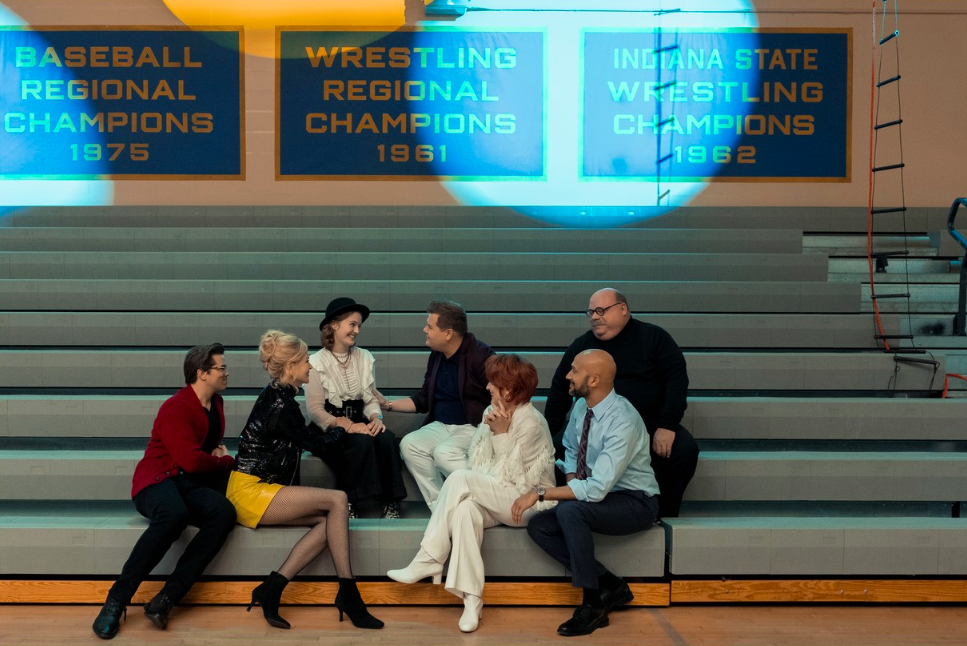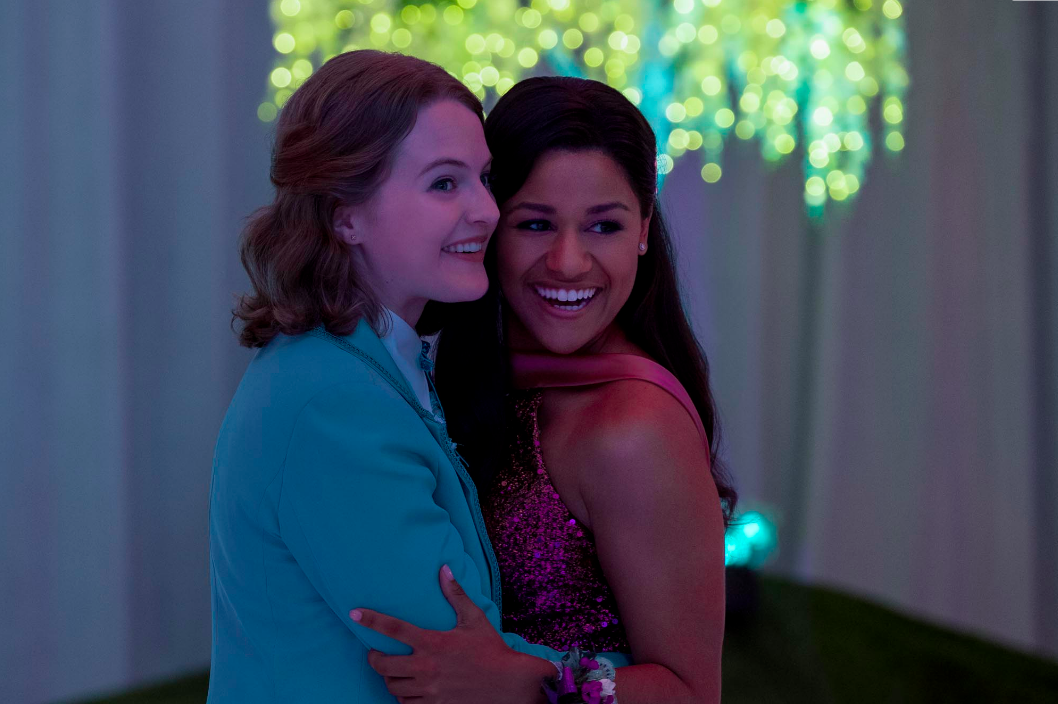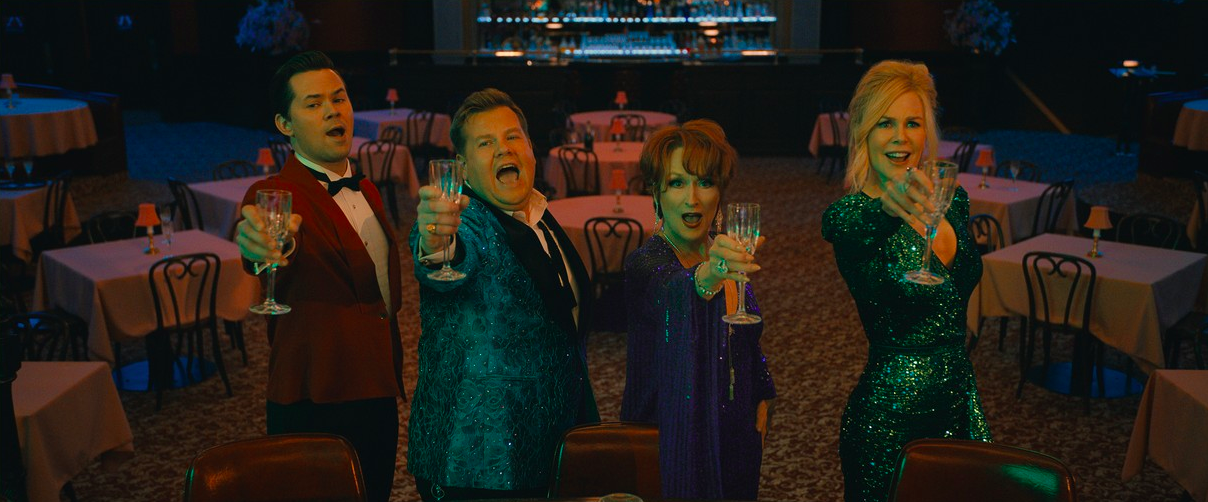The absence of live theatre this year has left a gaping, red-curtain-sized hole in my heart. Now that I’m desperately missing one of my favorite things, I rely on film adaptations of musicals to supplement those long-missing endorphins and make that magic more accessible.
New to Netflix, The Prom seemed like it could be the answer to my prayers. The glitz, glam, and star-power definitely acted as a draw, but my hopefulness almost immediately soured upon starting the film. With the perfect formula to succeed, how did this film not only fall flat but become hard to sit through? Too many ill-fitted choices add up to an off-putting and distracting experience.
In this film, four has-beens of the Broadway community (played by Meryl Streep, Nicole Kidman, James Corden, and Andrew Rannells) attempt to boost their image by becoming the faces of a small-scale social justice movement. They come across the story of Emma (Jo Ellen Pellman), a teen in Indiana whose wish to take her girlfriend to Prom develops into a major source of contention in her community, canceling the event altogether.
Acknowledging that this film draws deeply from the source material, I can’t help but notice that, in true Ryan Murphy fashion, this narrative is packed with dramatic tricks that don’t know when to quit, and barely enough laugh-out-loud one-liners for me to count on one hand. As the group of thespians tries to persuade the town to be more inclusive, what could have been a heartwarming tale descents into cliches and problematic undoings. Most concerning of all, Emma is cast aside and wholly invalidated when she truly deserves to be the heroine of this story.
The entourage of washed-up Broadway stars that swoop in to save the day are excellent examples of alternative hedonists who have absolutely no clue about, or actual dedication to, bridging the gap between the outcasted lesbians of the community and the bigots who marginalize them. Instead, they widen that gap. Well, that just means that there’s room for growth with these flawed and selfish characters, right? I guess that was the intention, but it really does feel like it misses the mark in that specific regard. As the plot stumbles forward, the sheltered stars’ attempts at empathy seem more and more misguided while they disguise themselves as genuine and helpful.

It becomes overwhelmingly frustrating to repeatedly watch Emma’s wishes play second-fiddle to the whims of her new “friends”. What is particularly irritating about this pattern is that the narrative tries so desperately to frame Emma as its protagonist while repeatedly shoving off her very real hardships in favor of the uneducated, privileged quartet of side-plots. I mean, how did we land in a queer narrative that focuses on a heterosexual love story?
Small actions continue to pile on, one on top of the other, to ultimately undermine Emma’s experience: putting her in a dress after she vocalizes she’d be more comfortable in a tux, changing the minds of every single homophobic classmate with one song about Jesus (I mean, the only time I want to hear Andrew Rannels sing about God is in The Book of Mormon), the rhetoric in the lyrics continuously associating queerness with “sin” and “unruliness,” the main antagonist (Kerry Washington) being forgiven in the context of the story but never apologizing to the child she tortures throughout the entirety of the film. Altogether, these decisions do not reflect what we know in 2020 to be helpful and productive contributions to media that explores gayness.
The final bone I’ll pick with The Prom is the unsettling feeling that the heroes of our story are actually quite manipulative. Emma, once again, makes it very clear that she has no desire to carry the weight of dragging her whole town out of the dark depths of homophobia. She just wants to be 17 and go to Prom with her girlfriend. All too often it is very obviously suggested that the group play up their friendship with Emma to get her to change her stance. A gaggle of characters whose whole purpose in this film is to advocate on behalf of this young girl spends the majority of their time convincing her to do the heavy lifting.
While Emma’s bravery and tenacity are inspiring and her methods are sweet, I fear that it reinforces the belief that every member of every marginalized community is burdened with the never-ending task of educating everyone around them. Through the magic of musicals, it did work out for Emma. But that is an exhausting expectation to uphold and it alleviates the burden of hard work on should-be allies.

I really did not want to, nor expected to, detest this film as much as I did. Its structure and commitment to the story felt both too silly and too lazy. I was shocked to realize how blatantly it oversimplified the struggles of gay youth in conservative and narrow-minded environments. Despite everything it was capable of, all of these poor choices strung together amount to nothing more than a counter-productive film.
Movie review was originally posted by Bianca Sbrocchi on December 30, 2020.

Comments